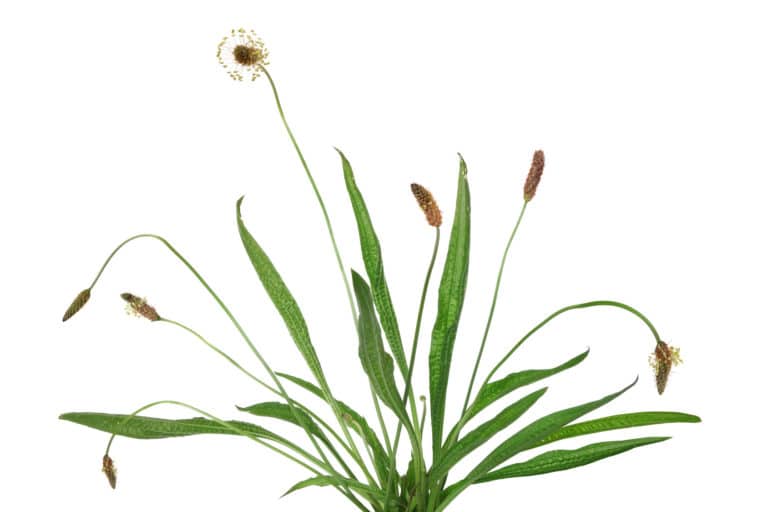Ribwort Plantain

The ribwort plantain (Plantago lanceolata) is one of the meadow weeds that almost everyone knows. It is also sometimes called serpent’s tongue or spearwort, which is due to the lance-like narrow leaves that literally shoot out of the ground like weeds. Yet the ribwort plantain is by no means a weed, quite the opposite. In 2014, it was even given the official title of “medicinal plant of the year”. We will explain why this is so and what positive properties the plant has in the next section.
Ribwort plantain feels most at home in cool, temperate zones. That is why it is native to cool regions and wide-spread in European countries as well as to North and Central Asia. The conspicuous cylindrical inflorescence, which can be seen between May and September, is very typical. The actual cream-coloured flowers are rather small and inconspicuous.
Ribwort plantain in natural medicine
Ribwort plantain has played an important role in natural and herbal medicine for centuries. In the Middle Ages, people became aware of the plant because, unlike most other plant juices, its sap did not go mouldy. Today, there is no doubt that it does indeed have many positive properties, because there are clear clinical studies on its proven effectiveness. For example, it has now been proven that ribwort plantain, when used internally, can help against classic cold symptoms and catarrh of the respiratory tracts. As a cough tea, it is often used against irritable coughs and bronchitis, because the expectorant, cough-attenuating, and irritation-relieving properties can prove effective for many patients. In addition, the medicinal plant alleviates inflammatory changes in the mucous membranes of the mouth and throat.
Anyone who suffers a minor injury while out in nature, for example while hiking or cycling, can place the (chewed) herb on the fresh wound. Thanks to its antibiotic and haemostatic effect, it contributes to wound healing. In this way, the leaves act as a kind of natural plaster.
In the case of insect bites, ribwort plantain soothes the itching and reduces the swelling.
Moreover, ribwort extract is considered to have a pronounced diuretic effect. This makes it ideal for “flushing out” a bladder infection.
The ingredients of ribwort plantain
The plant’s positive effects are primarily due to the secondary plant substances iridoid glycosides, above all the antibiotic, anti-inflammatory and anti-irritant aucubin and the similarly structured catalpol. As researchers have now discovered through tests in test tubes, the complex iridoid glycosides and sugars from ribwort plantain can promote or stimulate the “scavenging activity” of white blood cells.
The high proportion of tannins also has an astringent effect, and valuable mucilages (rhamnoglacturononans, glucomannans, arabinoglactans) coat the throat and pharynx, reducing the unpleasant scratching and burning sensation in the throat during colds. Also contained in ribwort: Silicic acid, caffeic and cinnamic acid derivatives, flavonoids and saponins.
Ribwort plantain in cosmetics
With its anti-inflammatory effect, ribwort is ideal for acne, blemished skin and eczema. Integrated in an ointment, as a gentle wash gel or as a facial compress, the plant provides a soothing and itch-relieving effect. Inflammatory changes are reduced and the skin’s appearance improves. Since the plant is extremely well tolerated, corresponding preparations can usually be used without any problems by people with sensitive and delicate skin. According to the current state of research, there is no sensitisation potential. Exception: People who suffer from a pollen allergy could possibly react to products containing the medicinal plant.
Ribwort plantain can also be used very well for hair care; oily hair and a scalp prone to dandruff in particular benefit from the healing powers of the plant. Shampoos with ribwort extract, but also hair conditioners and hair treatments prove to be very effective for quickly greasy hair and an irritated scalp.
Another positive effect: the silicic acid contained in the plant can help to firm the connective tissue.
Fact Sheet Ribwort Plantain Extract
INCI: Plantago Lanceolata Leaf Extract
CAS number: 85085-64-9
EC number: 285-388-1
Parts of the plant used: Leaves
Main ingredients: Iridoid glycosides (aucubin and catalpol), mucilages, tannins, silica, caffeic and cinnamic acid derivatives, flavonoids and saponins.
Properties: anti-inflammatory, astringent, wound-healing, haemostatic, antibiotic, inhibits the growth of microorganisms, soothing, diuretic
Fact Sheet Plantain Extract
INCI: Plantago Major Leaf Extract
CAS number
: 84929-43-1
EC number: 284-526-8
Effect and ingredients similar to ribwort plantain
We like to work with these raw materials containing ribwort:
| Tradename | INCI | Supplier | Remarks |
|---|---|---|---|
| Phytessence Plantago | Aqua, Glycerin, Plantago Lanceolata Leaf Extract | Crodarom | |
| 3Dermilyn | Aqua, Plantago Lanceolata Seed Extract | Solabia |
Ribwort plantain for cosmetic applications and formulations.
The herbaceous medicinal plant, which has been of great importance in folk and natural medicine for centuries, is also playing an increasingly important role in cosmetics. It is an excellent choice for impure skin, acne, eczema and even neurodermatitis, soothes itching and reduces inflammatory changes. Even with greasy hair and a flaky or irritated scalp, ribwort proves extremely helpful in very many cases. Other uses, for example on superficial injuries (as a natural plaster) or insect bites, clearly show the positive effect the plant has. We at Cosmacon are happy to support you in integrating the extract of the medicinal plant into your recipes. In doing so, we will of course respond individually to your requirements and ideas.
Literature:
Vasileva B, Staneva D, Grozdanova T, Petkov H, Trusheva B, Alipieva K, Popova M, Miloshev G, Bankova V, Georgieva M.Oxid Med Cell Longev. 2022 Aug 30;2022:8368717
Ashkani-Esfahani S, Khoshneviszadeh M, Noorafshan A, Miri R, Rafiee S, Hemyari K, Kardeh S, Koohi Hosseinabadi O, Fani D, Faridi E.World J Plast Surg. 2019 Jan;8(1):51-57
The Effect of Plantago major on Wound Healing in Preclinical Studies: A Systematic Review.
Cardoso FCI, Breder JC, Apolinário PP, Oliveia HC, Saidel MGB, Dini AP, Oliveira-Kumakura AR, Lima MHM.Wound Manag Prev. 2021 Jan;67(1):27-34